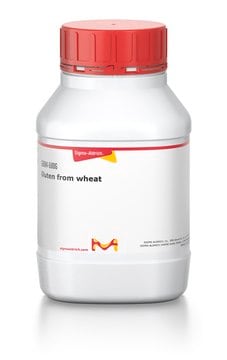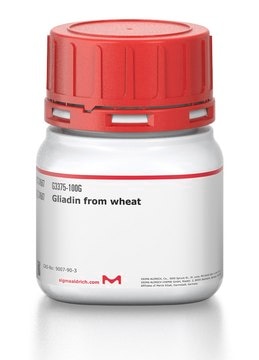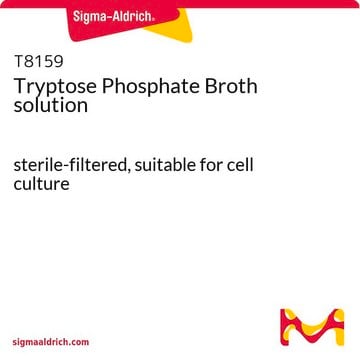Recommended Products
Looking for similar products? Visit Product Comparison Guide
Related Categories
General description
Zein is a prolamine and an alcohol soluble protein present in maize endosperm cells. Zein is a 20kDa structural protein and is encoded by the gene mapped on the short arm of maize chromosome 7. This protein lacks essential amino acids, such as lysine and tryptophan. Therefore, it has a poor nutritional value.
Application
Zein has been used as a biopolymer in electrospinning technique. It has also been used to blend starch involved in the manufacture of thermoplastic material.
Biochem/physiol Actions
Zein is used in the manufacture of fiber, adhesive, coating, ceramic, ink, cosmetic, textile, chewing gum and biodegradable plastics. This protein is a biodegradable and sustainable agropolymer. Thus, it is a great potential replacement for traditional oil-based plastics.
Storage Class Code
11 - Combustible Solids
WGK
WGK 3
Flash Point(F)
Not applicable
Flash Point(C)
Not applicable
Certificates of Analysis (COA)
Search for Certificates of Analysis (COA) by entering the products Lot/Batch Number. Lot and Batch Numbers can be found on a product’s label following the words ‘Lot’ or ‘Batch’.
Already Own This Product?
Find documentation for the products that you have recently purchased in the Document Library.
Customers Also Viewed
Novel route to stabilization of bioactive antioxidants by encapsulation in electrospun fibers of zein prolamine
Fernandez A, et al.
Food Hydrocolloids, 23(5), 1427-1432 (2009)
Amin Monfared et al.
IET nanobiotechnology, 13(6), 571-577 (2019-08-23)
Bridging strategies are required to repair peripheral nerve injuries that result in gaps >5-8 mm. Limitations such as donor-site morbidity and size mismatches with receptor sites for autografts, together with immunological problems associated with allografts and xenografts, have created an increased
Zein: the industrial protein from corn
Shukla R, et al.
Industrial Crops and Products, 13(3), 171-192 (2001)
Tahreem Riaz et al.
Journal of microencapsulation, 36(2), 192-203 (2019-05-12)
The Bifidobacterium bifidum susceptibility in gastrointestinal conditions and storage stability limit its use as potential probiotics. The current study was design to encapsulate B. bifidum using sodium alginate (SA, 1.4% w/v) and different concentration of zein as coating material, that
Lorina Bisharat et al.
International journal of pharmaceutics, 556, 311-319 (2018-12-18)
This study describes the preparation of free films of zein with and without acetylated high amylose maize starch (HAS) and their corresponding coated tablets as a novel approach to colonic drug delivery. We hypothesise that the embedding of a digestible
Our team of scientists has experience in all areas of research including Life Science, Material Science, Chemical Synthesis, Chromatography, Analytical and many others.
Contact Technical Service











